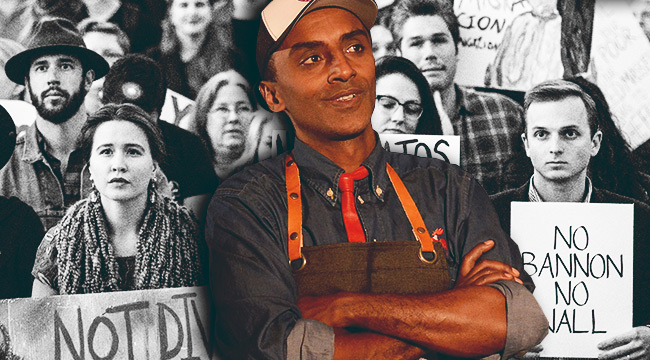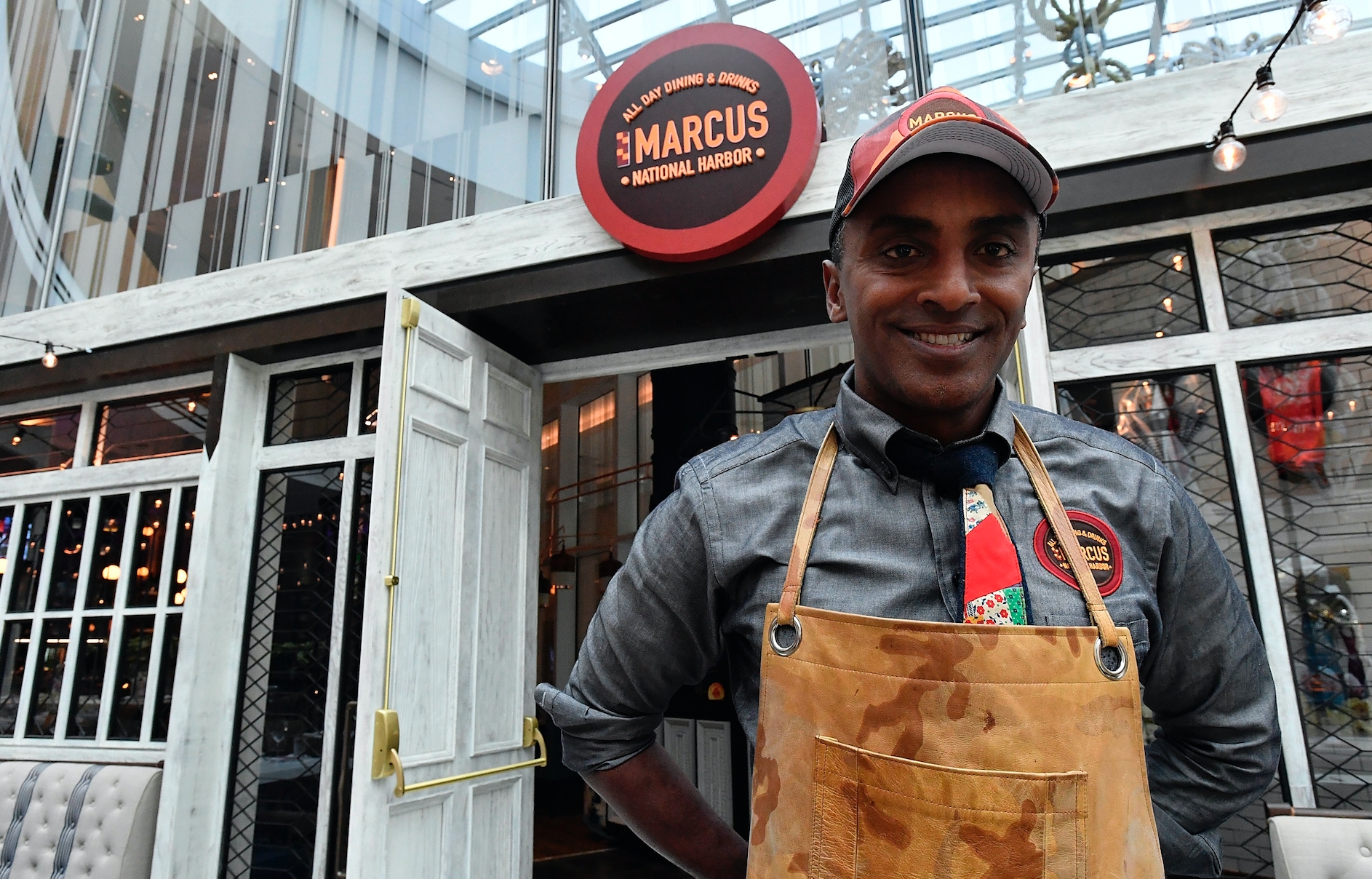
Marcus Samuelsson is one of the most exciting and enthusiastic chefs in the US, but he wasn’t born here. He left his homeland of Ethiopia as a child, when a civil war erupted in 1974, and was adopted by a family in Sweden, later attending culinary school there. After short stints at restaurants in Sweden and Austria, Samuelsson came to the states in 1991. At only 24 years-old, he became the chef at Auquavit in New York. That same year, he won a James Beard Award as the best chef in New York City.
Since then, the proud immigrant has gone on to author multiple cookbooks and open restaurants all over the world. This includes the lauded Red Rooster Harlem and the recently opened MARCUS at MGM National Harbor in Oxon Hill, Maryland. He’s also a TV star — serving as a judge on Chopped and a guest on a countless array of cooking shows.
This week, Samuelsson was kind of enough to sit down with us to answer a few questions about his newest restaurant endeavor, the importance of immigrants in the restaurant business, and the idea of the “celebrity chef.”
Can you tell us a little bit about the inspiration for your new restaurant MARCUS?
The food is really inspired by food from my immigration. It does have a Southern tone to it. But, just like being an immigrant to this country, the Swedish flavor is there, the African flavor is there, and that makes it very American to me. But the root underneath is Southern and I think it’s very good. It tastes a lot like comfort food, because you can eat a lot of these dishes with a fork, with a buddy, and be like “wow, that’s delicious, that’s fun.”
How are immigrants central to our restaurant culture?
Well, we can try for one day to do it without immigrants and see how that works out. Think about everything that we identify as our foods, American foods. Whether it’s Italian, or whether it’s French, whether it’s Thai. It’s such a good question because obviously with what’s been happening over the last week. As an immigrant you kind of wonder right? And I just actually asked myself that question too, like, “what would it be?”
And I don’t have a good answer for that, but I can say, “not as delicious without immigrants.”
Right, because America is a melting pot of everything.
I mean just take a Monday, or Tuesday, Wednesday of an average American family. They are probably having Mexican one day, and then maybe ordering a pizza one day, and then maybe having fried chicken on Thursday. You couldn’t even operate an American normal week schedule without influence from other cultures.
What does food culture have to teach us in the age of Trump?
I think it’s such an incredible opportunity for us to really hold on to what made us America in the first place. But dining out as a family is a great way to do it. Over the weekend I went to Greenpoint with a friend of mine, and I’m from Sweden but I’ve had great Polish food recently. And I haven’t had that in a long time, right? So, I’m in Brooklyn and that’s an option. I’m not just talking about food cultures that are up here, that you always read about, right?
Coming from a small country like Sweden, I’m super excited that people will start learning about Swedish food because it’s not really a culture that you can just find easily. You’re never going to go to Ethiopia in your life, right? Guess what? You go almost anywhere and you have multiple options of what Ethiopian food you want to eat. As an Ethiopian, and as a Swede, I’m so grateful that these mom-and-pop stores are around, because that might be the closest thing to someone like yourself, to actually, “Oh, no I do know that Ethiopian food tastes different than Nigerian,” or whatever it might be.
Obviously Ethiopia and Sweden are very different, culturally. How did those two countries impact your style?
You know they are very different, yes, but they’ve also been really great informers for me because there is something really good about both. Like, all those bar stools (at MARCUS) are very Scandinavian inspired, the patterns are very African inspired. The spices that you had today are almost all African inspired. They way I prepared the fish today, is very Swedish to me. So how I communicate to you, to the audience, I bring them with me to everything. And there is an overlap. Obviously it makes sense to me, but maybe not to the guests.
How did the winning a James Beard award at such a young age affect your culinary life? Did you feel a lot of pressure?
No, I had a three-star Michelin restaurant at that point, I had got three stars from The New York Times, and I’ve always looked at cooking as a very lucky gift to do something that I love. And the awards were great, because it’s like you won, acknowledgement that you were out there, you do this stuff but it’s not a bus stop, right? I know a lot of people that got a lot of awards, and then you have to say “Okay you’re on the right track, now move on.”

Who are your culinary heroes and inspirations?
My culinary hero was always Leah Chase. She opened one of the first integrated restaurants in America. So without her taking risks and chance, you and I wouldn’t even be talking. So it’s people like that that really took chances. Charlie Trotter, who passed away, about five years ago now. That to me changed American food into something and a lot of it.There’s this American guy (Trotter) in Chicago, introducing these ingredients that we’d never seen as chefs before. It’s like there’s something very rock-n-roll about it that I was like, “wow, can this be possible?” And he inspired a whole generation of chefs.
Speaking of taking chances, what advice do you have for young people who might be considering getting into the culinary world?
Cooking is a calling, that either, you want or you don’t. It’s not a job, it’s really a lifestyle that you’re choosing. It’s a lot like being in a band. Like outside looking in it doesn’t make any sense but to you, being in it, it’s everything. And I think if you are that person, you walk into a great industry. You will always have a job, you will always be busy.
What are some great things that you’ve seen in the culinary world that are really making you happy?
I think the diversity of the different ethnicities becoming more mainstream. You go from Mexican-American, to Thai-American, to Korean-American, to European-American. You see many more women in the kitchen, that’s been the biggest change since when I came to America. And of course, it’s like you bring up the question “are women great chefs” of course they are. It’s like, that’s not a question to me. But it’s so nice, when you go to chefs to see and they’re all ages, and they’re pushing. It’s nice that it’s happening.
How do you feel about the culture of the celebrity chef?
When I started cooking, that was not a thing yet. Maybe it was Julia Child, right? But everything has changed. If you would have asked me that ten years ago, that you could put your appetizer on Instagram, you know I would have been like “what are you talking about?” So, our culture has changed a lot, and you know I started cooking when it was just a trade like electrician or a plumber, and I could never have imagined that it would be this culture. I’m sure, very much like if you’re a theater actor even before that, I don’t think any actor thought about influencing the culture.
So part of what we do we has shown people that it’s gone from anonymous labor, to visible.






